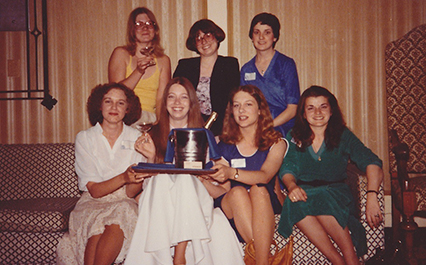Page Content

The Secondary English Language Arts Council began as a group of University of Alberta students who dreamed of becoming high school English teachers. While the council has long been disbanded, its members have remained lifelong friends for 38 years and counting.
Somewhere during our student teaching, we decided we should form an organization. Someone had the bright idea that it should be a sublocal of the Alberta Teachers’ Association. That led to the birth of the Secondary English Language Arts Council (SELAC) — a group of starry-eyed University of Alberta students who dreamed of becoming high school English teachers. Shortly after SELAC was founded, it earned its street cred at a subject-specific competition between departments. Our bunch of English majors (mostly from northerly regions) roundly trounced the would-be shop teachers in the nail hammering competition.
Just fresh from student teaching, we had one year of university left before we would have students of our own. We were enthusiastic. We were energetic. We were eager to inspire. We couldn’t wait to “make a difference.”
We met regularly, planned social events for students and professors, discussed job openings and shared hopes, motivations and dreams. After graduation, we attended the ATA English Language Arts Specialist Council conference at the Banff Springs Hotel where we met our senior colleagues and made believe we knew what “being a teacher” was all about. Shortly after that we spent a long weekend rodeoing and camping. And then we went our separate ways. SELAC disbanded but its members went on. We became English teachers.
We taught in remote northern villages and urban centres, online and face to face, in public schools and private ones. We coached sports and sponsored clubs and took kids on trips and volunteered. Some branched off into drama, world religions, social studies, math and administration. Some furthered their education. Some took time off to raise their kids. And through the decades, we persevered.
Although we mostly lived far apart, we stayed in touch. Sometimes we shared teaching ideas, discipline strategies, funny stories from the trenches, unit plans and resources. Occasionally we held reunions. More than that — we shared in each other’s lives. Marriages, births, new jobs, moves, graduations, new homes, travels, grandchildren. Retirement. We suffered together with family issues, aging parents and mourned deaths, including the loss of our beloved Donna, who died much too soon.
This summer, 38 years later, at the edge of a sleepy northern lake, we met again to share good food, reminisce and talk about travel and books and curriculum change. We shared what we were doing in retirement, from supporting a family of Syrian refuges to volunteering with the local Legion. We talked about kids and parents. Thought-provoking conversations and new memories.
All teachers need a tribe of colleagues who mentor and support them through their journey. SELAC was my first such tribe, although it was not my last.
Was teaching what we dreamed it would be? Did we make the connections with students we hoped for? Did we inspire? Did we “make a difference”? That is not for me to say. But as I looked at the faces of these lovely women as they sat laughing around the table, I am glad I found them. I am glad I found my tribe. They made a difference in my life.
And I bet most of them can still hammer a nail faster than any shop teacher. ❚
Nicola Ramsey recently retired from teaching after 18 years with the Alberta Distance Learning Centre. She lives in Slave Lake.
Moot Points is your chance to write about a funny incident, a lesson learned or a poignant experience related to teaching. Please email articles to managing editor Cory Hare: cory.hare@ata.ab.ca.
